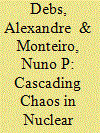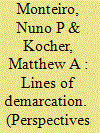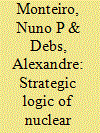|
|
|
Sort Order |
|
|
|
Items / Page
|
|
|
|
|
|
|
| Srl | Item |
| 1 |
ID:
159267


|
|
|
| 2 |
ID:
150500


|
|
|
|
|
| Summary/Abstract |
Qualitative historical knowledge is essential for validating natural experiments. Specifically, the validity of a natural experiment depends on the historical processes of treatment assignment and administration, including broader macro-historical dynamics. But if validating a natural experiment requires trust in the ability of qualitative evidence to establish the causal processes through which the data were generated, there is no good reason for natural experiments to be considered epistemically superior to historical research. To the contrary, the epistemic status of natural experiments is on a par with that of the historical research on which their validation depends. They are two modes of social-scientific explanation, each with its own pros and cons; neither is privileged. We illustrate this argument by re-examining an important recent contribution to the literature on violent conflict: Ferwerda and Miller’s 2014 natural experiment estimating the causal effect of the German decision to devolve authority to the Vichy French government on violent resistance during World War II.
|
|
|
|
|
|
|
|
|
|
|
|
|
|
|
|
| 3 |
ID:
135329


|
|
|
| 4 |
ID:
135330


|
|
|
|
|
| Summary/Abstract |
When do states acquire nuclear weapons? To address this question, a strategic theory of nuclear proliferation must take into account the security goals of all of the key actors: the potential proliferator, its adversaries, and, when present, its allies. To acquire nuclear weapons, a state must possess both the willingness and the opportunity to proliferate. Willingness requires the presence of a grave security threat against which no ally offers reliable protection. Opportunity requires that the state pursuing nuclear weapons possess high relative power vis-à-vis its adversaries or enjoy the protection of a powerful ally. Whereas a relatively weak state without a powerful ally lacks the opportunity to develop a nuclear capability, one with such an ally lacks the willingness to do so. Therefore, only powerful states or relatively weak states with allies that do not guarantee fulfillment of at least some of their key security goals will acquire the bomb. These claims are supported by the overall pattern of nuclear proliferation as well as detailed analyses of the Soviet, Iraqi, Pakistani, South Korean, and West German nuclear development cases.
|
|
|
|
|
|
|
|
|
|
|
|
|
|
|
|
| 5 |
ID:
108840


|
|
|
|
|
| Publication |
2011-12.
|
| Summary/Abstract |
The United States has been at war for thirteen of the twenty-two years since the Cold War ended and the world became unipolar. Still, the consensual view among international relations theorists is that unipolarity is peaceful. They base this view on two assumptions: first, the unipole will guarantee the global status quo and, second, no state will balance against it. Both assumptions are problematic. First, the unipole may disengage from a particular region, thus removing constraints on regional conflicts. Second, if the unipole remains engaged in the world, those minor powers that decide not to accommodate it will be unable to find a great power sponsor. Placed in this situation of extreme self-help, they will try to revise the status quo in their favor, a dynamic that is likely to trigger conflict with the unipole. Therefore, neither the structure of a unipolar world nor U.S. strategic choices clearly benefit the overall prospects for peace. For the world as a whole, unipolarity makes conflict likely. For the unipole, it presents a difficult choice between disengagement and frequent conflict. In neither case will the unipole be able to easily convert its power into favorable outcomes peacefully.
|
|
|
|
|
|
|
|
|
|
|
|
|
|
|
|
|
|
|
|
|